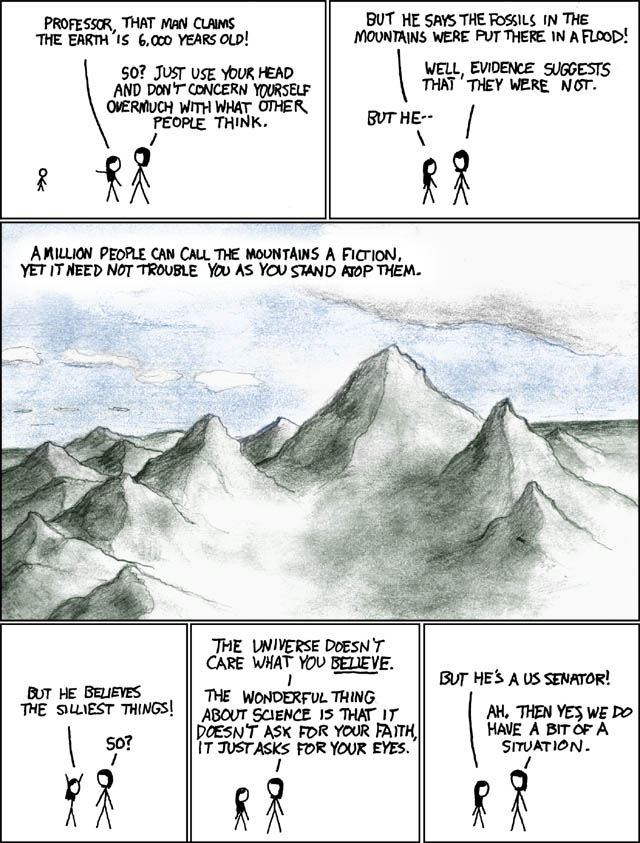Seeing that this thread is more than 100 pages, i wont bother reading any of it. Besides, I'm sure it's just filled with people saying "You're wrong, you're stupid for believing what you believe".
I can't say I want to take a side in this argument, though I am atheist. But in response to the TS, I'd have to say that you're missing the point of religion. Religion, also known as "faith" or "belief" is not based on "proof" or any sort of empirical logic, hence it is known as "believing".
But before I begin explaining things, I must ask one question. What parts of the Bible can be interpreted literally, what parts figuratively? Should we take passages such as those that make God seem like some sort of sick, sadistic tyrant figuratively or literally? People would say figuratively of course. But when it comes to passages that make God a near-perfect virtous entity, people take these passages literally. So is what distinguishes "literal" and "figurative" how it impacts your religion's reputation? Yes, this is how people usually distinguish the difference between figurative and literal. (And if you say "all of the bible is to be taken literally", you are a complete moron that doesn't even understand the workings of your own religion)
I'm not against this, so let's take "The law of the LORD is perfect" [Psalms 19:7] for it's literal meaning. Why not? It praises the LORD's word. So for now, I'll assume that this is passage is true and should be taken by its definition. (this is only so i have literal evidence that theist beliefs claim that god is omnipotent, but if you already believe god is omnipotent just disregard this part)
If anyone were to mix the two, religion and pragmatism, then pragmatism and logic would almost surely overcome religion. For example, let's look at religion as if it were a science and we could relate to it with logical steps. So we're given the quote from before, "The law of the LORD is perfect". It's widely accepted as true and besides, all theists know that their god is perfect and all, but lets take this piece of literal evidence into thought anyway.
Alright, if we were to mix the two, science and religion we can easily prove that god's omnipotence is nonexistent. Observe the following:
"The law of the LORD is perfect"
The creator of this "law" must be perfect to create something perfect.
Perfection is free from flaws
Weakness is a flaw
Perfection is free from weakness
God is perfect therefore he is free from weakness making him all powerful and omnipotent.
(that may have been unnecesary (it's also a possible verbal fallacy), but it's important to base his "omnipotence" off of someting, but if you already "know" that god is omnipotent, then disregard the previous arguments. let's continue)
If god is omnipotent, he has the power to do anything. ANYTHING.
God can create heavy stones.
God can lift heavy stones.
But can god create a stone so heavy? that he himself cannot lift?
Here is an obvious paradox that comes with omnipotence. omnipotence, following logical guidelines and limits is impossible.
Without omnipotence, what is God?
This brings us back to my main point. Religion should never be mixed with any sort of logic or scientific reasoning.
The point of faith is to give people hope and allow them to believe, no matter how dire the consequences, and im sure this is very helpful in many situations. How some people don't realize the difference still puzzles me. Religion/faith is a whole different subject itself and destroys itself when mixed with pragmatic rationality. Faith is what it is about.
I'm not saying there is no god, I'm not saying there is. Its all based on belief. If you choose to believe in God, God exists. If you choose not to, God does not. You cannot use logic to prove or disprove religion because that is contradictory itself. Belief does not have to be based on evidence or proof (which is why people say "if god were to just show himself, there would be no point to religion" because these people understand the difference) if god were to show himself or stop all the atrocities in the world, religion would cease to exist, and there would be no point in faith or hope anymore. That is why it's called faith, it requires no evidence, no proof, but you can still come to the conclusion that your life has meaning and happiness. Doesn't that seem like a much happier existence, to believe and be happy rather than sulk around and waiting for everything to be proven? That, TS, is how anyone can believe in God.
I AM SURE THERE ARE SEVERAL MISTAKES IN THIS POST, BUT IF YOU HAVE READ ANY OF WHAT I WROTE, YOU SHOULD BE ABLE TO UNDERSTAND THE MAIN POINT OF BEHIND IT.


